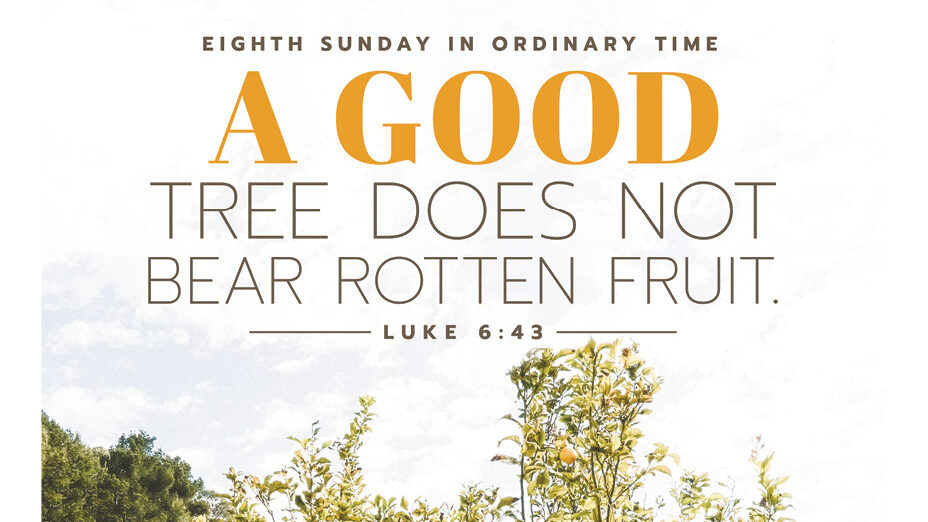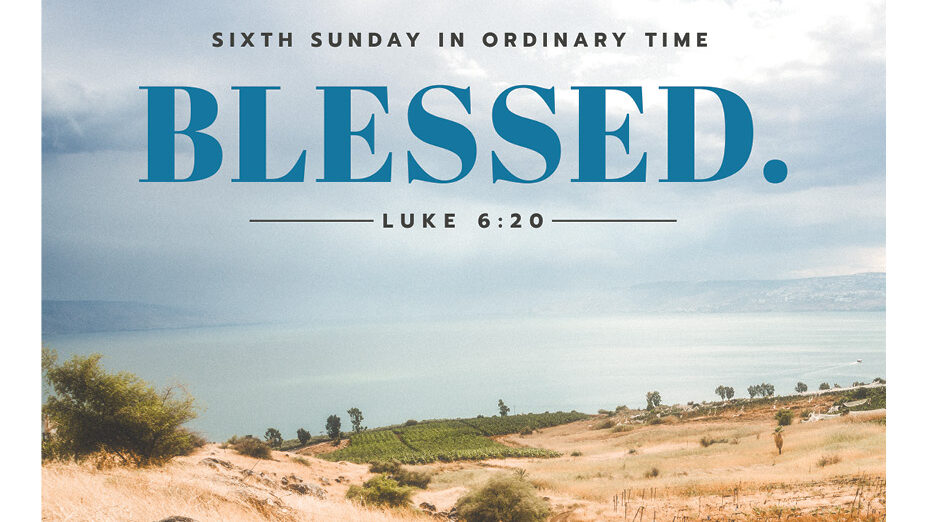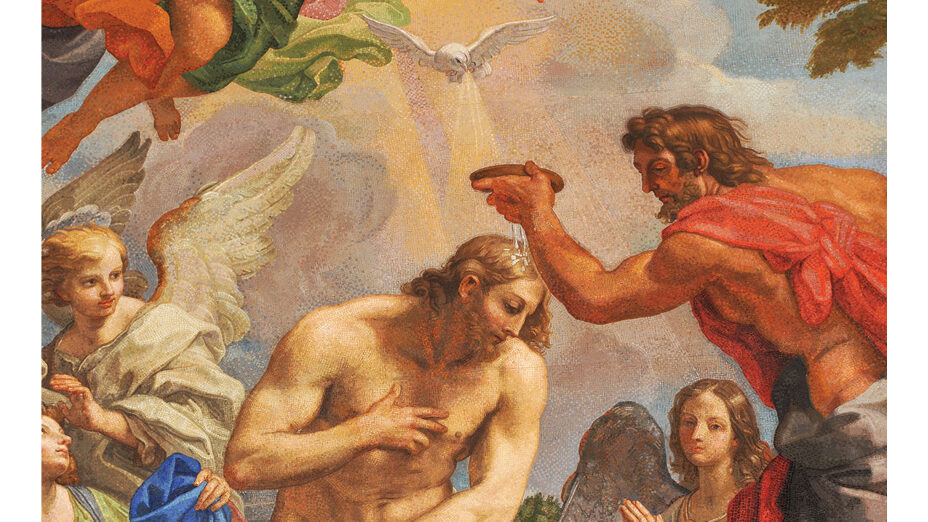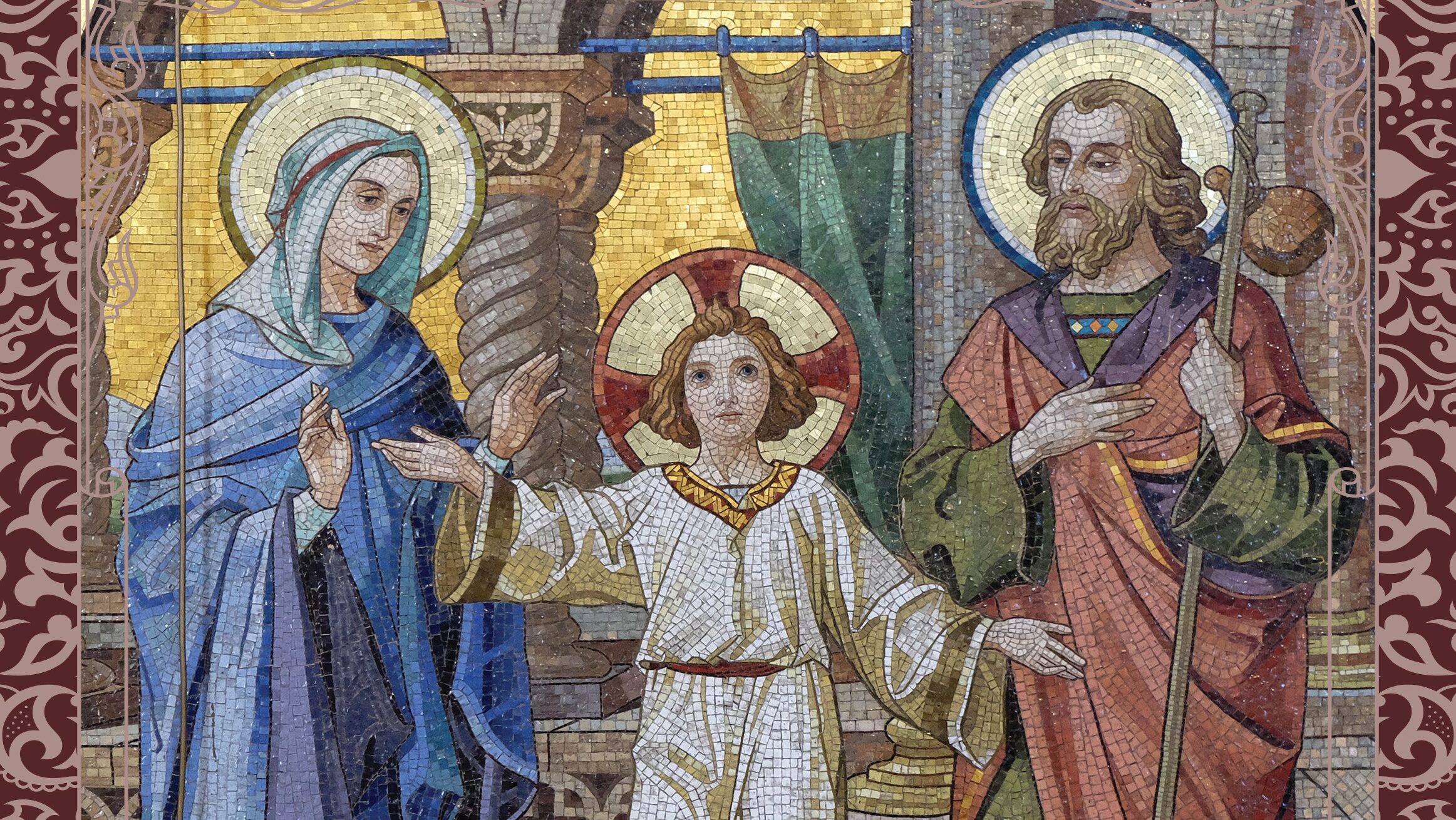March 2, 2025
Dear Parishioners,
There are simple habits that we only realize their importance when we forget to do them. Waking up in the morning, cleaning up, eating a piece of cake or drinking a glass of milk, then rushing to get in the car to go to work, forgetting to look in the mirror. Sometimes peanut butter is stuck on your face, the rim of a glass of milk or orange juice stained your lips, but you still go to meet a client or customer, who wouldn’t blush when you realize it? Worse still, forgetting to zip up your zipper or leaving toilet paper hanging down your back while still being cheerful in public is truly shameful. Looking in the mirror is a very simple but very important thing. Forgetting to do it can lead to losing your job or at least losing customers.
We want to show the world that we are neat and polite people, so we have to look in the mirror not just once but many times a day. And we all know that neatness and politeness on the outside is not as important as maturity and prudence on the inside. But have we ever asked ourselves: what is the human mirror that helps us recognize what is sloppy and ugly inside?
Let me say right away that no one does not have a human mirror that helps them recognize their own shortcomings and bad habits. Each person has not just one but many such human mirrors. They are the people who live closest to them. The human mirror of the wife is the husband, and vice versa. Then the siblings and parents, relatives and colleagues also constantly show us what in us is an eyesore, a deviation, and not good in their eyes.
When we look in the mirror and recognize a blemish on our face, a mistake in our clothing, we are secretly happy because we have corrected it in time. But when a human mirror only shows a bad trait or weakness, we naturally object. Why? Is it because we only want to correct our external appearance, while disregarding our inner maturity?
Definitely not. There are many reasons why we silently thank the glass mirror but are annoyed with human mirrors. Jesus in today’s Gospel shows us a basic reason, “Why do you see the speck in your brother’s eye, but do not notice the log in your own eye?” We are annoyed with human mirrors because each of us is a mirror. We also see in the person who just pointed out to us some bad habits and many other imperfections. In our mind we say to ourselves, “You are not any better than me, why are you showing off?”
It is always easier to see the shortcomings of others than to recognize our own. Just observe the conflicts between couples and we will see. The wife always has a long list of her husband’s bad habits. Conversely, the husband also lists many ways his wife has hurt or embarrassed him. When you consider carefully, it is not certain whose list is longer.
However, the way the husband and wife handle their lists is often very different. The wife will communicate her list to an intermediary – a priest, nun or family counselor – in detail, and most importantly, will tell them her husband’s sins, not just once but repeatedly. The husband, on the other hand, will rarely dare to express all his grievances to his wife, but will only share them with someone he trusts – sometimes a priest, sometimes a mediator.
When couples come to me to express their family problems, I want an office that is like a police station when they investigate. One person stands outside behind a one-way glass wall, seeing and hearing the two people inside, but the person being investigated cannot see the person standing outside. I want the husband to hear the wife’s discontent, and the wife to hear the husband’s sadness. Listening to each other completely and thoroughly is always an important first step to reconciliation. This is the most difficult step.
Another sad reality is: everyone thinks that the other person must change for things to be better, without thinking about changing themselves. Everyone wants to change others, but they refuse to change themselves. As such, things will not improve but will get worse. The reason is simple: no one can change others, only themselves. Without accepting this truth, it is impossible to improve yourself and your family.
Ancient cultures and masters through the ages have sounded the same message, in many different forms. Know Yourself – To know others is good knowledge, to know oneself is wisdom – Cultivate yourself, regulate your family, govern your country, and bring peace to the world – Knowing yourself and others, and you will win every battle. Jesus said bluntly, “You hypocrite! First take the log out of your own eye, and then you will see clearly to take the speck out of your brother’s eye!”
Standing in front of a mirror, no one is crazy enough to object to the stains or wrinkled clothes that appear before them. Each of us needs to learn to humbly listen to human mirrors tell us about our shortcomings and weaknesses. Do not argue or object. But take the time to examine ourselves. When others point out our shortcomings, they are our teachers. If those weaknesses are true, thank that person, and ask God to give you patience and wisdom to correct them. If you find some untrue points, silently ignore them, without making excuses or explanations. If that human mirror is your husband or wife, ask them how they can best help you correct them.
What must never be forgotten is: a useful mirror not only shows the ugly and dirty things but also reveals the beauty and nobility of the person looking in the mirror. Human mirrors should show each other the good qualities, sacrifices, and nobility of the people they live with. A human mirror that only shows the bad and the ugly is just a useless mirror, no one wants to live near it. But a mirror that brightens the beauty of the person looking in the mirror is a divine mirror.
In the Most Holy Trinity and in solidarity with you all,
Fr. Duc
Ông Bà Anh Chị Em quý mến,
Có những thói quen đơn giản mà chúng ta chỉ ý thức được tầm quan trọng của chúng khi mình quên làm. Sáng dậy, làm vệ sinh, ăn miếng bánh hay uống ly sữa, rồi vội vã lên xe đi làm, quên soi gương. Có khi peanut butter dính trên mặt, vết miệng ly sữa hay ly nước cam dính trên mép, mà cứ hiên ngang đi gặp thân chủ hoặc khách hàng thì khi nhận ra ai mà không đỏ mặt? Tệ hơn nữa là quên kéo zipper lên hay để toillet paper dính lòng thòng sau lưng mà cứ hớn hở giữa công chúng thì quả là đáng hổ thẹn. Soi gương là việc hết sức đơn giản nhưng cũng rất quan trọng. Quên làm có thể dẫn đến mất việc hay ít nhất mất khách.
Chúng ta muốn chứng tỏ cho thiên hạ biết mình là con người gọn gàng lịch sự nên chúng ta phải soi gương không chỉ một lần mà nhiều lần trong ngày. Và chúng ta ai cũng biết là vẻ gọn gàng lịch sự bên ngoài chưa quan trọng bằng sự chín chắn trưởng thành bên trong. Nhưng có bao giờ chúng ta tự hỏi: đâu là tấm gương nhân bản giúp cho mình nhận ra những gì là lôi thôi lếch thếch và xấu xa bên trong?
Xin thưa ngay rằng không ai là không có tấm gương nhân bản giúp mình nhận ra những khuyết điểm tật xấu của mình. Mỗi người có không chỉ một mà nhiều tấm gương nhân bản ấy. Đó là những người sống gần gũi nhất với mình. Tấm gương nhân bản của vợ là chồng, của chồng là vợ. Rồi cả anh chị em và cha mẹ, họ hàng và đồng nghiệp cũng không ngừng chỉ cho chúng ta thấy những gì nơi chúng ta là chướng mắt, là lệch lạc, là không tốt trong đôi mắt họ.
Khi chúng ta soi gương và nhận ra một vết nhơ trên mặt, một sơ xuất trong trang phục, thì chúng ta mừng thầm vì kịp thời chỉnh sửa. Còn khi một tấm gương nhân bản chỉ cho thấy một tính xấu hay nhược điểm thì chúng ta tự nhiên phản đối. Tại sao? Có phải là chúng ta chỉ muốn chỉnh sửa dung mạo bên ngoài, mà coi thường sự chín chắn trưởng thành bên trong không?
Chắn chắn là không. Có nhiều lý do cho việc chúng ta thầm cám ơn cái gương bằng kiếng nhưng lại khó chịu với những chiếc gương con người. Chúa Giêsu trong bài Phúc Âm hôm nay chỉ cho chúng ta một lý do căn bản, “Sao anh thấy cái rác trong con mắt của người anh em, mà cái xà trong con mắt của chính mình thì lại không để ý tới?” Chúng ta khó chịu với các tấm gương nhân bản là vì mỗi bản thân chúng ta cũng là một chiếc gương. Chúng ta cũng thấy nơi kẻ vừa chỉ cho mình một số tật xấu không ít những khiếm khuyết bất toàn khác. Trong đầu chúng ta tự nhủ, “Ngươi đâu có hay ho gì hơn ta mà bày đặt?”
Thấy khuyết điểm của kẻ khác bao giờ cũng dễ gấp bội việc nhận ra khuyết điểm của mình. Cứ quan sát sự lủng củng giữa các cặp vợ chồng sẽ thấy. Người vợ thì lúc nào cũng có sẵn một danh sách tràng giang đại hải những thói hư tật xấu của chồng. Ngược lại, ông chồng thì cũng liệt kê không ít những gì vợ làm mình tổn thương hay mất mặt. Xét cho kỹ thì chưa chắc danh sách của ai dài hơn ai.
Tuy nhiên, việc sử lý danh sách của hai vợ chồng thường rất khác nhau. Người vợ thì phổ biến danh sách của mình cho một người trung gian – cha, sơ hay cố vấn gia đình – một cách rành mạch chi tiết, và nhất là kể tội chồng mình cho chính ông ta biết, không chỉ một lần mà lập đi lập lại nhiều lần. Còn người chồng thì ít khi dám bày tỏ mọi sự bất bình của mình với vợ, mà chỉ chia sẻ được với ai mình thật tin tưởng – có khi là một tu sĩ, có khi là người trung gian.
Khi có những cặp vợ chồng đến bày tỏ với tôi về những rạn nứt trong gia đình của họ, tôi muốn có một văn phòng giống như sở cảnh sát khi họ điều tra. Một người đứng ở ngoài sau bức tường kiếng một chiều, nhìn và nghe được hai người bên trong, nhưng người bị điều tra không thấy được người đứng bên ngoài. Tôi muốn người chồng nghe được tâm trạng bất bình của vợ, và người vợ nghe được tâm sự u uẩn của chồng. Lắng nghe lẫn nhau một cách trọn vẹn và thấu đáo bao giờ cũng là một bước khởi đầu quan trọng cho việc giải hòa. Đây là bước khó nhất.
Một thực tế đáng buồn nữa là: ai cũng cho rằng người kia phải thay đổi thì mọi chuyện sẽ tốt đẹp hơn, mà không hề nghĩ đến việc thay đổi chính mình. Ai cũng muốn sửa đổi người khác, còn mình thì không chịu sửa đổi. Cứ thế, mọi chuyện sẽ không cải tiến mà càng ngày càng tệ hại hơn. Lý do đơn giản là: không ai có thể thay đổi được người khác, mà chỉ có thể thay đổi chính mình. Không chấp nhận chân lý ấy thì không thể cải tiến chính mình cũng như gia đình mình được.
Các nền văn hóa cổ kính, các bậc tôn sư qua bao thế hệ, đều nhắc nhở cùng một thông điệp, dưới nhiều dạng khác nhau. Hãy biết chính mình Know Yourself – Tri nhân giả trí, tự tri giả minh – Tu thân, tề gia, trị quốc, bình thiên hạ – Biết mình, biết người, trăm trận trăm thắng. Chúa Giêsu thì nói thẳng, “Hỡi kẻ đạo đức giả! Lấy cái xà ra khỏi mắt ngươi trước đã, rồi sẽ thấy rõ, để lấy cái rác trong mắt người anh em!”
Đứng trước tấm gương bằng kiếng, không ai điên khùng phản đối những vết nhơ hay bộ quần áo nhăn nhúm hiện ra trước mặt. Mỗi người chúng ta cần học được tâm tình khiêm nhường lắng nghe những tấm gương nhân bản kể ra những bất toàn yếu đuối của mình. Không biện bác hay phản đối. Nhưng dành ra thời giờ để kiểm điểm chính mình. Khi ai chỉ ra cái dở của ta thì là thầy ta. Nếu những bất toàn yếu đuối đó là sự thật, cám ơn người ấy, và xin Chúa cho mình sự kiên nhẫn và khôn ngoan để sửa đổi. Nếu tìm ra một vài điểm không thật thì âm thầm bỏ qua, không bào chữa giải thích. Nếu tấm gương nhân bản ấy là chồng hay vợ mình, hãy hỏi họ có thể giúp mình sửa đổi cách nào tốt nhất.
Điều không bao giờ được quên là: một chiếc gương hữu dụng không chỉ cho thấy những gì lem nhem xấu xí, mà còn làm lộ ra nét đẹp, sự thanh cao của kẻ soi gương. Những tấm gương nhân bản càng nên tỏ cho nhau thấy những tính tốt, sự hy sinh, và vẻ cao quý của những người đang chung sống với mình. Một tấm gương nhân bản chỉ trưng bày cái xấu thì chỉ là tấm gương vô dụng, không ai muốn sống gần. Còn tấm gương làm sáng lên vẻ đẹp của kẻ soi gương là một tấm gương thần.
Hiệp thông trong Chúa Ba Ngôi và hiệp nhất với ông bà anh chị em,
Lm Tôma Vũ Minh Đức, SJ




